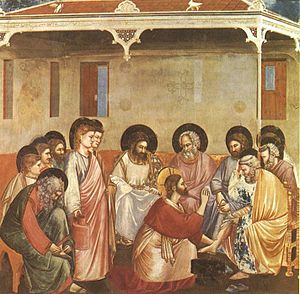The first I read of Piper's comments were from Tim Gombis's blog. Gombis wrote:
Piper’s claim matches the dynamics of imperialism: “It is God’s will that power is consolidated in our hands, and this is for your good. We know what’s best for you, and we have the best of intentions.”This reminded me of a quote from Augustine's "City of God." Noting that God "gives earthly kingdoms to both good and bad," Augustine says:
"And therefore earthly kingdoms are given by Him both to the good and the bad; lest His worshippers, still under the conduct of a very weak mind, should covet these gifts from Him as some great things." (Book IV, Chapter 33)Augustine's point is that earthly power isn't the sign of God's blessing or favor. Its arbitrariness--that it is given to wicked as well as good people--shows its cheapness in God's eyes. It's like rain that falls on the just and the unjust. You don't have to be really good or holy or righteous to have power (or wet fields).
I certainly couldn't argue with Augustine. Which makes the assumption that God gives power to those he approves of wrong. Which calls into question the assumption that God wants certain people to have political power because they are right and just and appointed to be his instruments for conforming society to his will. Which pretty much calls into question the whole way Christians across the political and theological spectrum think and act in the political sphere. Because to some degree we've all fallen into the trap of thinking: "God gave (or wants to give) power into our hands for your good. It is good for us to seek and use that power." And resistance is sinful.
This is a complex theme. God does call all people, rulers and ruled, to obey him. He does expect us to live out his Kingdom on this earth, and he will judge all of us for what we have and haven't done. But he also tells us that his kingdom is not of this world. There is a balance in being Christ's people in the world. Part of that balance is drawing a line between calling leaders to follow Christ and recognizing that Christ Jesus does not bring his kingdom into the world through the kingdoms of the world.
Yes, that's got almost nothing to do with John Piper's quote. I just thought it ought to be said.



